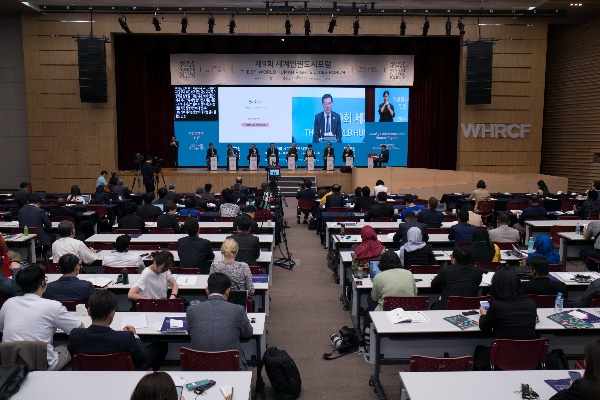2020 WHRCF Is Coming to Town
페이지 정보
본문
Human Rights in the City of Light: WHRCF Is Coming to Town

The World Human Rights Cities Forum (WHRCF), marking its 10th anniversary this year, will be held under the theme of “The Future of Human Rights Cities: Local Memories and Global Sharing” from October 7 to 10 at the Kim Daejung Convention Center in Gwangju. The 10th Forum will be further enriched by the presence of two organizations: the UN OHCHR and UNESCO as co-hosts of the forum for the first time.
The 10th WHRCF is paying special attention to the temporal arrangement of the human rights cities with reflection on the history of human rights at the local level being and being shared on the global level. It will assess the present while planning for the future of human rights cities – all within the flow of time – as an effective way to enhance the sustainability of human rights cities. Therefore, it will be a place to discuss how we can inherit and incorporate historical memories and legacies of the past into a future human rights city through human rights education as a modern form of remembrance.
In the plenary sessions, the mayors of human rights city will discuss ways to broaden the Human Right City movement and share the human rights policies implemented by local governments to mitigate the COVID-19 crisis as well as to talk about further challenges. In addition to thematic sessions, examining practical tasks to promote human rights for all citizens including the elderly, women, the disabled, and other minority groups; networking sessions; and special sessions will be scheduled to discuss and find solutions for ways to deal with human rights issues and to expand and cooperate within the human rights cities network. There will also be a workshop to discuss overall management of the Gwangju International Human Rights Training Center and the Blended Learning Course on Human Right Cities for local governments of the Asia-Pacific region. Citizens can also participate in the special events and side events such as the Human Rights Discussion Groups and the Dark Tour via VR (virtual reality).

The WHRCF is introducing advanced conference technology, creating the new goal of being a model for “digitect” international conferencing. “Digitect” refers to a new cultural reality allowing face-to-face interaction remotely through cutting-edge digital technology. Although it is difficult for foreign speakers to attend a face-to-face meeting due to the COVID-19 situation, participation by overseas mayors, which was previously difficult, has increased significantly this year through the application of this digital technology. The WHRCF has also been selected as a promising international conference for growth in the Korea Tourism Organization’s meeting technology competition. Accordingly, it will be able to introduce various technologies such as VR, AI, video conferencing solutions, holograms, and streaming.
The opening ceremony and plenary sessions will be streamed through ZOOM and YouTube, and also broadcast on SBS (the Seoul Broadcasting System) the following day. As mayors of human rights cities around the world are expected to participate, simultaneous interpretation in Korean, English, and German will be provided through the ZOOM webinar platform. In particular, the opening ceremony will showcase high-tech meeting technologies for the participants by utilizing holograms that connect overseas speakers in real time and synthesized voice through AI.
Meeting technology is available not only online but also to onsite participants. For the convenience of domestic and foreign participants, the WHRCF is creating a smartphone application to guide participants to the location of the venue and to provide information on the meetings, precautions for participation, and various functions such as networking with speakers and viewing meeting handouts. Participants using the application can receive all the information they need for and during the event without needing to visit the onsite information desk and can check the notices provided by the secretariat in real time. For participants who are hearing or visually impaired, the WHRCF will provide an iPAD equipped with Apple’s “Accessibility Support.”
Hybrid meetings, combing face-to-face meetings with video conferencing, account for 80 percent of all sessions. The speakers can participate in presentations and Q&A sessions via ZOOM with reduced times and reduced burden in comparison to previous onsite forum sessions. For the forum session, speakers have been invited from a variety of different fields. Participants can take part in meetings through ZOOM or YouTube streaming without needing to be onsite. “120 years of the Korean Democratic Journey,” a joint event, will be open to participants through an online VR tour. The Gwangju Dark Tour will be produced and provided with video content for everyone.
Because of the pandemic, many international conferences have been canceled or postponed indefinitely. Nevertheless, the 10th WHRCF is doing its best to promote online participation by utilizing meeting technology and establishing quarantine measures to prevent infection of onsite participants so as to successfully and safely host this event.
The WHRCF is not focusing on non-face-to-face guidance methods for efficiency, but is using technology so that groups for which information-gathering is challenging can actively participate in the forum. Most of all, it is also building software for the elderly and the disabled, for whom movement is more restricted.
The World Human Rights City Forum, in marking its 10th anniversary, will be a quality and growing event as a “digitect” international conference without surrendering to the pandemic situation.
※ This article was originally published in Gwangju News September 2020 issue.
Gwangju News is the first public English monthly magazine in Korea, first published in 2001 by Gwangju International Center. Each monthly issue covers local and regional issues, with a focus on the stories and activities of the international residents and communities.
▶ Read our magazine online at www.gwangjunewsgic.com
※ Copyright by Gwangju International Center. All rights reserved. No part of this website content covered by this copyright may be reproduced in any form or by any means – graphic, electronic, mechanical, photocopying, recording or otherwise – without the written consent of the publisher.

